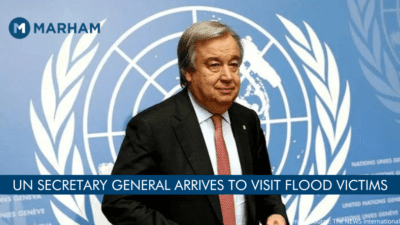United Nations Secretary-General António Guterres has arrived in Pakistan for his three-day visit this week, from September 9 to 11, 2022. He will be visiting the areas affected by recent floods and attending meetings with the Pakistani leadership and senior officials.
The super flood in Pakistan has killed over 1300 people, including 400 children. Along with the destruction of property and agricultural land, the flood has bought many diseases. Due to heavy rains and floods, dengue cases have risen to alarming levels. Moreover, there is a huge threat of waterborne disease which could take many lives.
Post-arrival the UN Secretary-General in Pakistan uploaded a tweet saying:
“I have arrived in Pakistan to express my deep solidarity with the Pakistani people after the devastating floods here. I appeal for massive support from the international community as Pakistan responds to this climate catastrophe. “
Upon the arrival of the UN Secretary-General in Pakistan, Hina Rabbani Khar, the Minister of State for Foreign Affairs received him at the airport. He went on to meet with the Prime Minister of Pakistan, Shehbaz Sharif.
During their conversation, the two discussed the super flood and its impact. Prime minister, Shehbaz Sharif stated that the federal and provincial administrations, as well as other stakeholders, including the military forces, are collaborating to deliver assistance and rescue to 33 million people.
He further emphasized the importance of foreign assistance as Pakistan begins its reconstruction and rehabilitation phase. Pakistan’s floods, according to PM Shehbaz, are a clear expression of climate change, and it is past time to pay attention to the problem.
PM, Shehbaz Sharif further thanked the Secretary-strong General’s support and advocacy in mobilizing international aid, notably the $160 million UN “Flash Appeal” to fund Pakistan’s Flood Response Plan.
UN Secretary General’s Remarks:
According to Radio Pakistan, the UN secretary said :
“I want to say a few words to the international community. Pakistan needs massive financial support to respond to this crisis that has cost according to some estimates I have heard today about $30 billion and counting.”
Guterres stated that while Pakistan had made minimal contribution to climate change, it was one of the most severely affected areas by the consequences of climate change.
Expressing his support for flood-affected people, he said: “My voice and my services are entirely at the disposal of the government of Pakistan and the people of Pakistan.”
Antonio further highlighted the issue of climate change by saying: “Apart from the massive support required for rehabilitation and reconstruction, the whole issue of climate change needed to be addressed with the kind of urgency, seriousness, and responsibilities that it deserved.”
Guterres will also be visiting flood-affected districts in Balochistan and Sindh, where he will interact with flood victims. He might also hold a news conference at Karachi airport on Friday evening after personally meeting the flood victims.
Consequences of Floods in Pakistan:
The recent floods in Pakistan have caused drastic damages to citizens, property, agriculture, and the overall economy of the country. Floods have submerged 7 million hectares of total cultivated land, accounting for approximately 33% of the total 22 million hectares.
According to preliminary estimates provided by provinces to the Ministry of Food Security and Research, agricultural and animal losses total Rs298 billion.
The 72 worst-affected areas in Pakistan already have significant levels of poverty which makes the problem even worse. There is also a threat of an increase in waterborne infections. Since these are largely caused by a lack of clean and safe drinking water, as well as inadequate sanitation and hygiene standards.
No doubt Pakistan is in dire need of support from the international community right now. According to a Foreign Office Spokesperson: “The UN Secretary’s visit will contribute towards enhancing commensurate and coordinated international response to the humanitarian and other needs of the 33 million affected Pakistanis.”

